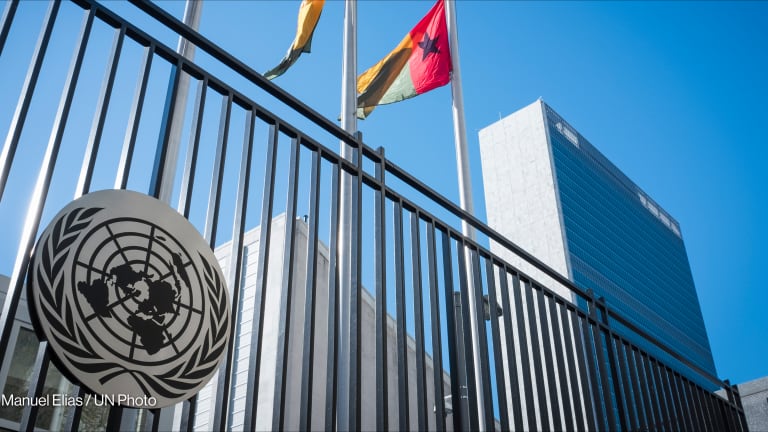
UNITED NATIONS — Humanitarian workers are struggling to overcome multiple and varied access obstacles to adequately reach nearly 20 million people in Yemen, where a crisis situation around food insecurity and health continues to deteriorate, U.N. Development Programme Yemen Country Director Auke Lootsma said today.
Lootsma called for a redoubling of international efforts to fund the world’s largest humanitarian crisis, which requires an “unprecedented response,” he told U.N. headquarter reporters via a video call from the Yemeni capital Sana’a on Tuesday.
“I compare it to a bus of Yemenis racing towards the edge of a cliff. Without hitting the brakes and [turning] around, the one that controls the direction of the bus keeps going and pushes the accelerator [and is] all but certain to crash,” Lootsma said. “I think we can still stop this bus before it goes over the cliff, but time is really running out.”
Multiple access issues — from obtaining visas to physically reaching people in need — are hampering the humanitarian response in Yemen, Lootsma said, explaining that humanitarian workers are operating well beyond their mandate and capacity.
See more related stories:
▶ Why was the cholera vaccine shipment to Yemen canceled?
▶ With limited aid, Yemen cholera 'getting worse every day'
▶ New dangers in Yemen food crisis with use of landmines, port bombing fears
▶ Donors pledge $1.1B to Yemen, with 'one hand tied behind their backs'
▶ Children face 'immediate risk of death' as famine looms in Yemen
Approximately 20 million people in the Arab nation — or 70 percent of the country’s population — now require humanitarian assistance. And the U.N. expects Yemen’s cholera outbreak, now the largest in the world, to continue unabated. Approximately 400,000 cholera cases and nearly 1,900 deaths have been reported since this spring. More than half of the country’s health facilities and hospitals have been badly damaged or destroyed, and the breakdown of basic public amenities — including trash collection and clean water — as well as the suspension of pay to city servants have created a perfect storm for diseases to quickly fester.
Humanitarian workers, meanwhile, are struggling to keep up with the demand of work required and to maneuver around red tape, especially as they try to move between regions held by rival factions, such as Sana’a and Aden
“When it comes to the visas, and this is both applicable to staff of NGOs as well as aid workers for the U.N. in general, we see sometimes delays, or complete denials of visas on both sides because we have to apply for different visas. Sana’a requires a different visa [than] if you go to Aden,” Lootsma said.
“Doing our best means thus far we simply have not been able to cover all of the needs that are in the country. The current situation is way beyond our capacities and our needs.”
In other cases, humanitarian workers have had to obtain permits to reach “difficult” areas within the country.
The UNDP country director also reported news of a meningitis outbreak, but did not have details as to what extent this disease has spread.
Seven million Yemenis are considered close to slipping into a state of famine, as the country nears its third anniversary of internal conflict between a rebel movement, known as the Houthis, and a military coalition — which backs the internationally recognized government — led by Saudi Arabia and the United States. The country remains divided, with Al Qaeda also controlling swaths of territory.
The U.N.’s $2.1 billion humanitarian appeal for Yemen is only about 43 percent funded. A high-level pledging event in April raised more than $1 billion, fulfilling, at the time, about half the amount the U.N. had requested. The international response is a “highly prioritized humanitarian response plan,” but does not cover all the needs in the country, Lootsma said.
Lootsma described the ongoing food security crisis as a man-made disaster, resulting from decades of underinvestment in one of the poorest Arab countries — which is almost entirely dependent on food imports — but also as a “war tactic of economic strangulation.”
In 2015, Saudi Arabia launched a military coalition, which at the time included nine African and Middle Eastern countries, to influence the internal conflict in Yemen and move it in the direction of the forces fighting in favor of former president Abd-Rabbu Mansour Hadi, and away from the Houthis, who it sees as an agency of Iran.
Following months of airstrikes — and direct attacks on health facilities — the U.N. declared its highest-level humanitarian emergency in Yemen, which has experienced a major drop in imports over the past two years, given multiple blockades on major ports.
Lootsma called on all of the warring parties to reach a peaceful resolution. The implications of the layered, worsening crisis in Yemen will otherwise be felt for generations to come, he warned.
“Shockingly, Yemen’s population of 27 million is set to double by 2050. Sana’s water tables continue to sink to further depth. Climate change will have further negative impact on the agriculture of production. The closing of schools will have a long-term effect on children’s education, and, of course, malnutrition will have an impact on stunting and other health issues,” he said.
“The catastrophe we see unfolding before our eyes will claim lives and scar future generations in the country for many years to come.”
Read more international development news online, and subscribe to The Development Newswire to receive the latest from the world’s leading donors and decision-makers — emailed to you free every business day.




